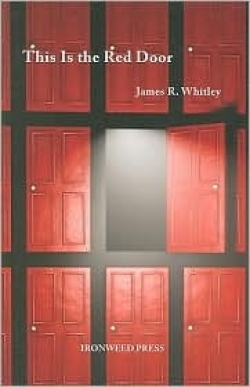It looks like you've stumbled upon a page meant to be read by our code instead of viewed directly. You're probably looking for this page.
This Is The Red Door
Winner of the Ironweed Press Poetry Prize and one of two collections released by Whitley in 2009, This Is the Red Door is elegiac and meditative. While it takes up residence in the psyche, the book is equally grounded in the material of fruit and kitchen countertops. In the physics of boiling water, in a hairline crack in a bedroom mirror, Whitley can see the subtle workings of our relations and the fate of all things.
Formally diverse, the collection concentrates on the endurance of pain. It explores hunger and satiety, endless craving and loss. Food operates as a metaphorical vehicle and prods thought. Many of the poem titles are foods-“Raspberry Pecan Vinaigrette”; “Chai Tea, Raw Sugar”; “Habanero”; “Wild Berries.” The collection’s epigraph is the first sentence of Revelation 3:20, a scripture reference that recognizes the importance of a shared meal: “If anyone hears my voice and opens the door, I will come in and eat with him, and he with me.” Companionship and food are inextricable, conflated in metaphor. “I think back, imagining myself as / the springform pan-my embrace, / unfulfilled, holding out for more.”
A series of three poems describes dining alone. In “Pumpkin Cheesecake for One,” the speaker halves a recipe, an act that leads to the conclusion: “And after all of this mess, this reduction, / the product still pressured to be, somehow, / whole.” What is the self without another? Half a recipe, perhaps-separated, but whole.
Each section of the book is marked with a preposition, and these do much to support the book’s themes. Prepositions are connecting words, and this is a book about romantic bonds. The order of the prepositions suggests movement: the speaker moves in, through, and out, and this passage is reaffirmed by the closing of the door opened in the first lines of the book. But the movement is not linear. “There will be others,” the book promises. The “necessary cycles” of emotion continue.
Whitley knows how to extend commonplaces-fruit and uncapitalized parts of speech. He knows how to speak in the voice of someone whose loss sets the timbre of his surroundings. This is a collection with wide appeal; the foodie, the romantic, the grieving will all find entrance.
Disclosure: This article is not an endorsement, but a review. The publisher of this book provided free copies of the book and paid a small fee to have their book reviewed by a professional reviewer. Foreword Reviews and Clarion Reviews make no guarantee that the publisher will receive a positive review. Foreword Magazine, Inc. is disclosing this in accordance with the Federal Trade Commission’s 16 CFR, Part 255.
